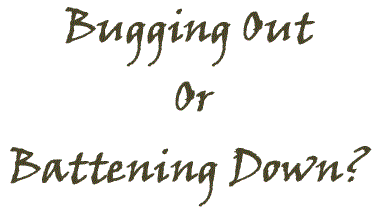
Over the years I have read several blog posts, and statements in many different preparedness/survival forums about bugging out that I want to challenge today. I call them “myths” because, as I see it, they are just not true. The trouble with these myths is that the person saying them might not mean it as a hard and fast rule but the person new to preparedness who reads it, might not understand that.
Myth One: You Have to Bug Out
This is probably the biggest of the myths; that there are many reasons that you’ll have to bug out. The truth is that for the vast majority of scenarios, you will be safer, more secure, and more comfortable by battening down and staying home. Home is where your family feels the safest. It is where you have a routine and familiar surroundings. In dire times, those two things go a long way to uphold our mental wellbeing.
Home is also where all of your preparations are and where you’re best suited to face the most “come, what may” scenarios.
Myth Two: You Don’t Need a Bug Out Plan
This is the other camp that says they won’t ever bug out and don’t need a bug out plan. As I mentioned above, in the vast majority of scenarios, staying home or “bugging in” is a better solution. To me, this means that the events you do need to bug out for are much more serious. Events that could push me from my home are things like imminent fire, flooding, a prolonged grid down or civil unrest in an urban and some suburban areas. When do you know you should bug out? When you would be safer leaving than staying. The events I described could be extremely dangerous, so not having a plan to put in action, having BOB’s and a plan for bugging out, is equally as dangerous.
Myth Three: You Need a Bug Out Location (BOL)
The majority of preppers don’t own a separate piece of property that they consider their BOL. The truth is, you don’t need one. Sure, it might be ideal, but it isn’t needed. Below is a way to develop multiple locations. That way you have four routes out of your area. First, if you have a relative or friend outside of your general area, consider asking them if you could head there.
If you don’t have another location to go, I recommend finding a town that’s big enough to have a hotel but small enough to be inconspicuous, which is thirty to sixty miles away. I say “large enough to have a hotel” because that is the landmark. If they have a room available, stay if you like. If you want to continue on, do so. Do this going north, south, east and west. Now develop a couple different routes to each location and label the routes “1” and “2”. We purchased plastic foldable maps and have one in our BOBs and one in the vehicle.
I think each car should have a map and the directions to each location. If you’re at work and your spouse is at home when you need to bug out, you can send a text or email that says “North, route 2”. Now you know where they are going and the route they’re taking to get there.
Myth Four: BOB’s Need to Last 72 Hours
Many times BOB’s are referred to as “72 hour kits”. The purpose of a BOB should be to get you from your home to your BOL and to last a minimum of three days, or 72 hours. As I have stated above, the events that would actually force me to bug out are pretty serious. If I have to leave, there is a good chance it won’t be safe for me to return to my home in 72 hours.
My point is that you might have to make do for longer than 72 hours. Keep that in mind when stocking your BOB. You don’t know if you’ll find a working ATM while you’re out so you might consider keeping cash or precious metals in your BOB so you can restock while you’re bugged out.
Myth Five: Your BOB Needs to be as Light as Possible
There have been more posts and comments about this than any of the other myths. Anytime someone makes a forum thread and shows their BOB, there are always people who make a comment like “Good luck carrying that”. I always wonder where these scoffers are planning on bugging out to. Me? I plan on driving. If there is some type of event that keeps me from driving, I can think of five ways to carry my BOB and other gear as well.
Maybe they plan on heading to the deep woods? For 95% of people, that is a bad idea. Even if you are a primitive skill master and can make do with a knife and a dirty look, what about your family?
Since the events that you actually need to bug out for are severe and you don’t know when you’ll be able to go home, what will you do in the woods when your supplies run out?
My thoughts are that if I do have to bug out there is a pretty serious reason. Since I don’t know how long I might need to be away, I want to make sure I have enough gear to take care of my family. I’m more concerned with making sure I have what we need than I am with the weight of the pack. On the very slim chance I can’t drive and have to carry it, I can find means to negate the weight.
My Bug Out Plan
If there is something that forces us to leave, we’ll grab the BOB’s and other gear and load the truck. We’ll then head to one of our locations and keep an eye on the situation. If something happens that would force us to walk, we have a wagon and would find a shopping cart nearby as well. In the winter we have a couple children’s sleds we could load up and tow behind us.
I hope this helps clear up some misconceptions about bugging out. I look forward to reading your comments.
If you liked this article please think about sharing it on the social media listed below, thanks!






